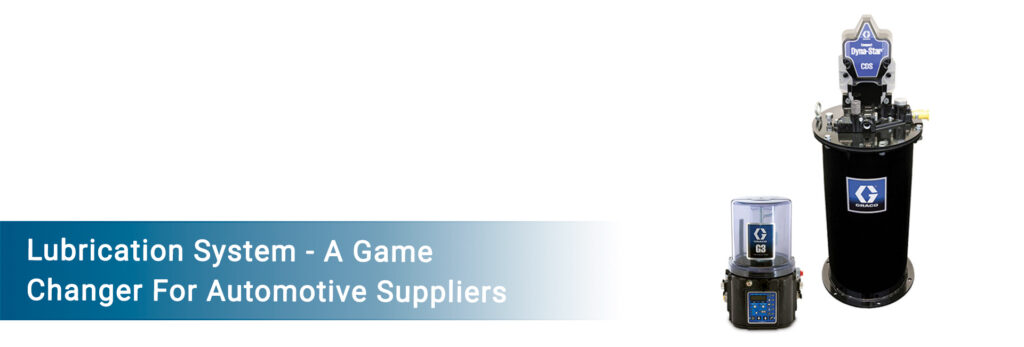In this blog, we will cover various benefits of lubrication system for automotive suppliers and manufacturers.
Did you know that a single unlubricated bearing can cause an entire production line to halt, leading to significant financial losses for automotive suppliers? Since, the automotive industry thrives on efficiency, and one major thing that maintains it is the lubrication systems used. The lubrication system has become an indispensable thing in the changing landscape of automotive manufacturing. In the highly dynamic Indian auto market, lubrication systems have revealed themselves as game changers for vehicle component makers. This is backed by the fact that it improves their operations and productivity.
Understanding the evolution and significance of lubrication systems in such high-stakes environments can provide automotive suppliers with a competitive advantage. .
What exactly is a Lubrication System and its uses?
A lubricating system is a specialized system used for automatically supplying moving parts of machines with substances like oil or grease. They prevent damage by cutting down friction and wear caused by extra fluid application at fixed periods that enable smooth running of the machinery.
Major Uses of Lubrication Systems:
- Reduces Friction: It lowers friction between moving elements, thereby reducing machine wear outs thus increasing lifespan.
- Prevents Overheating: It acts as a coolant by minimizing heat generation from contact, hence preventing overheating that could lead to breakdowns.
- Enhances Efficiency: It facilitates uninterrupted flow and, hence, enhances productivity
- Reduces Downtime: It inhibits unexpected breakdowns thereby lowering maintenance costs bringing about less downtime and higher operational efficiencies.
- Lowers Energy Consumption: By reducing friction, more energy-efficient operations become attainable leading to lower power consumption levels through improved machinery performance.
- Minimizes Maintenance Costs: Automatic greasing reduces frequent checks on site plus maintenance activities which means reduced expenses involved.
Evolution of Lubrication Systems
Lubricating systems have gone through constant improvements along the way in the automobile industry. Initially, manual lubrication was relied upon, which saw workers applying the grease directly to machines using their hands. This process was not only time consuming but also prone to human beings errors which meant inconsistent greasing of machines leading to increased wear and tear.
Automatic lubrication systems changed everything about this industry. These types of systems ensured the exact and regular application of grease on moving parts. Hence, reducing downtime while increasing equipment’s life span. From basic manual activities over the years, they have developed into high-tech automatic alternatives that form an essential part of modern automotive plant production.
In India, the adoption of automatic lubrication systems has been thriving. As a result, the manufacturers are striving to keep up with increasing demand with efficiency. With the ability to automate the lubrication process, auto suppliers are focused on streamlining their production activities, leading to better efficiency when the products are being manufactured.
Importance of Lubrication Systems for Automotive Suppliers
For automobile parts suppliers, proper lubrication is not just a maintenance activity but it’s a critical aspect of their operations as whole units. Machines run smoothly, and breakdowns are an expensive repair that is avoided with a well-maintained system. This is particularly important as even minor disturbances might cause significant delays or financial losses within automotive manufacturing.
The quality of products being made also depends on lubrication systems. Good lubrication application guarantees that the equipment will work at optimal efficiency, thereby leading to high-quality automotive components that meet the strictest demands of the modern market. This is particularly true in India’s auto suppliers industry, where competition is so tough, and a high reputation for quality is crucial.
Additionally, the right lubrication system can significantly reduce energy consumption. These systems minimize friction and wear, thereby making machines function more efficiently, reducing energy costs and environmental impact. This will mean not only cost savings but a sustainable production process as well for auto suppliers.
Impact of Lubrication Systems on Automotive Suppliers & Manufacturers
The impact of lubrication systems on automotive suppliers cannot be overstated. Many advantages result from these systems that improve overall effectiveness and productivity within supplier’s operations.
- Lubrication systems help minimize manual intervention, freeing up human resource capital, which can be used somewhere else in other vital areas. This leads to a more efficient use of labor, reducing costs and increasing output. Given the competitiveness of India’s market, where margins are typically thin, this is very important.
- The use of auto-lubrication systems has contributed to a decrease in idle downtime. These systems ensure that machines are always well-oiled, hence avoiding sudden failure and increasing their life span. In turn, maintenance costs are minimized, and production schedules remain on track, thereby enabling automotive suppliers to meet their delivery schedules.
- Lubrication systems guarantee a safe working environment. Automating this process or function where mechanical aspects can limit human expertise. Hence, increasing the chances of risking accidents due to worn-out machine parts as a result of wrong oiling procedures. For car manufacturers in India, this would lead to fewer work-related injuries and more safety for their employees.
- The introduction of lubrication systems is consistent with the emerging trend towards industry 4.0 and smart manufacturing. As they embrace Industry 4.0 and manufacturing, automotive suppliers are taking up digitalization and automation, thus making lubrication systems crucial for them. They help suppliers to incorporate their operations into larger frameworks within which smart manufacturing is being done through remote monitoring plus regulation of oiling processes.
Lubrication Systems Offered by Patvin Engineering
Patvin Engineering has been at the forefront of providing lubrication solutions as part of its transformation process. It delivers an array of these machines that cater to Indian automotive suppliers’ needs, thereby incorporating efficiency and reliability into it.
Patvin Engineering’s automatic lubrication systems are particularly well-suited to the demands of the automotive industry. Consequently, machines are always correctly serviced, which therefore cuts down on wear and tear as well as prolongs the lifetimes of the tools involved. Regardless of whether it is a large-scale production or some specialized line operation, Patvin Engineering offers tailor-made solutions for every automobile supplier in India.
FAQs
A lubrication system for automotive suppliers is designed to deliver precise amounts of lubricant to machinery, reducing wear and enhancing performance. This leads to enhancement of productivity and minimization of downtime.
An auto lubrication system automates the grease application process, eliminating manual errors and increases productivity. This leads to consistent lubrication of moving parts, preventing friction and overheating, prolonging equipment life thus improving overall efficiency in automotive manufacturing.
Key components of an automotive lubrication system include a reservoir for storing lubricant, a pump for distributing it, and metering devices that control the amount delivered to each point. These systems ensure that every part receives the right amount of lubricant at the right time.
Here in Patvin Engineering, we specialize in high-quality lubrication systems which are tailored for automotive suppliers. Our systems are designed for reliability and efficiency, helping manufacturers reduce energy consumption and improve product quality.
Using a lubrication system in automobiles plays a critical role in minimizing friction and heat between moving parts which enhances performance and extends the life of components. Lubrication leads to better fuel efficiency thus reduces emissions, downtime and maintenance costs.



